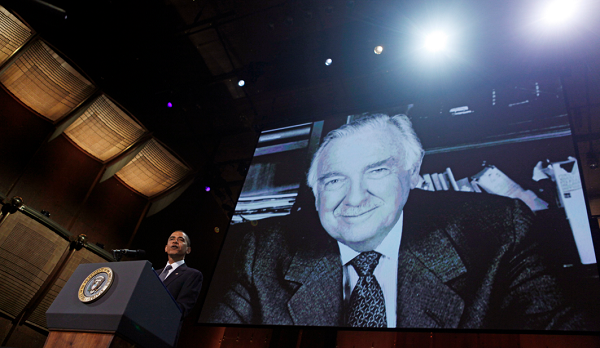Walter Cronkite 100th Birthday: Facts, Quotes, Pictures Of CBS Evening News Legend

Legendary broadcast news anchor Walter Cronkite would have turned 100 years old on Friday. During the 1960s and 70s, the renowned TV journalist, who was once considered the “most trusted man in America,” delivered smart, accurate and objective news to the masses while anchoring CBS’ evening news program for 19 years.
Cronkite and his objective “watchdog” reporting style brought Americans comfort and awareness during some of the most intense and trying times in the nation’s history, and Google Doodle is celebrating Cronkite’s centennial with an animated highlight reel of some of the news anchor’s most famous reporting moments, including World War II, Watergate, the Vietnam War and the President John F. Kennedy’s assassination.
Honor the Missouri native, sometimes referred to as Uncle Walter, on his 100th birthday by checking out a few facts, quotes and pictures of Cronkite below.
Today's Google Doodles celebrates Walter Cronkite's 100th birthday https://t.co/lpu9zz4C2E via @poynter
— Andrew🎙️ Media | Branding | Star Wars | Cannabis (@andrewmatranga) November 4, 2016
1. Cronkite was a big advocate for free speech and the media, but one of his most respected attributes was his ability to deliver clear, concise and objective reporting on every topic. “Press freedom is essential to our democracy, but the press must not abuse this license,” he once wrote. “We must be careful with our power. The free press, after all, is the central nervous system of a democratic society.”
2. At the end of every news segment, Cronkite wrapped up his reports with his classic catchphrase, “and that’s the way it is.”
3. He knew he wanted to be a journalist when he was just 12 years old after reading about a foreign correspondent in Boys’ Life magazine.
4. It was in 1972 when Cronkite was deemed the “most trusted man in America,” after an Oliver Quayle poll surveyed hundreds of Americans. The news anchor not only beat members of the Senate and House of Representatives but every other well-known journalist and even the president and vice president.
100yrs ago #Today, Walter Cronkite, broadcast journalist and clear voice of the space program, was born https://t.co/QaKxQP8fdC pic.twitter.com/LJAuSoCb3J
— Massimo (@Rainmaker1973) November 4, 2016
5. Cronkite’s career started taking off shortly after the attack on Pearl Harbor in December 1941 when he volunteered to be a war correspondent. During the war, Cronkite covered air war against Germany while living in England, and he reported on the Allied invasion of North Africa from a ship off the Moroccan Coast. Following his stint in Europe, Paramount used his newsreel reporting in a North African campaign.
6. Cronkite was actually offered a position with CBS twice. The first time CBS journalist and producer Edward R. Murrow offered Cronkite a job with the network following his World War II reporting, Cronkite turned him down for a job with United Press’ radio station. However, years later after Cronkite reported on historic US moments like the Battle of the Bulge, the Nuremberg trials and the early beginnings of the Cold War, Murrow asked Cronkite to work for CBS again in 1950, at which time he finally accepted the job. Cronkite stayed with CBS, where he later became a news anchor in 1961, until he retired in 1981.
© Copyright IBTimes 2024. All rights reserved.





















